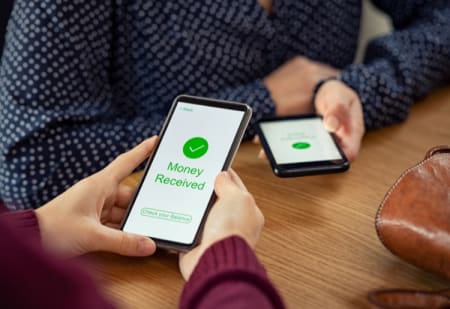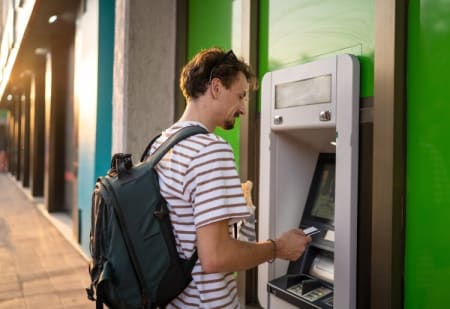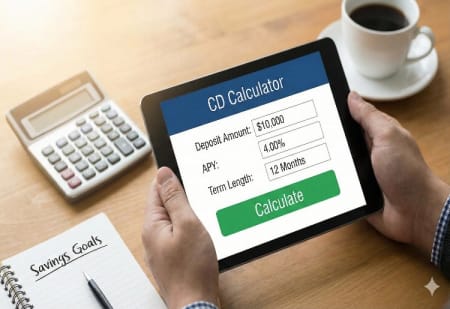Online Banking Articles & Guides
Learn more about online banking. Explore different account types and stay up to date with useful information and banking advice.
This site is a free online resource that strives to offer helpful content and comparison features to our visitors. We accept advertising compensation from companies that appear on the site (this may include when a visitor clicks a link, or when their application is approved, their account is opened, or their account is funded), which may impact the location and order in which brands (and/or their products) are presented, and may also impact the score that is assigned to it. Company listings on this page DO NOT imply endorsement. We do not feature all providers on the market. Except as expressly set forth in our Terms of Use, all representations and warranties regarding the information presented on this page are disclaimed. The information, including pricing, which appears on this site is subject to change at any time.

Enjoy the Best of Both Worlds with a Money Market Account
A money market account is a type of savings deposit that combines higher interest rates with flexible access to your funds. Offered by banks and credit unions, it’s ideal for savers who want better returns than a standard savings account — without giving up liquidity.

How Many Bank Accounts Should I Have?
While juggling multiple accounts can seem daunting, a strategic "bucket" system can help you stay organized, maximize interest, and ensure your funds are protected.

How to Transfer Apple Cash to Your Bank Account: Step-by-Step Instructions
From coffee runs to splitting bills, Apple Cash has changed how we handle day-to-day expenses.

Why You May Need a Separate Business Checking Account
Managing your business and personal finances through the same account might seem convenient, but it could be holding your business back.

What’s the Typical Minimum Balance for Online Savings Accounts?
When you open a savings account, there are several requirements to keep an eye out for, including monthly maintenance fees, initial deposits and minimum balances.

How to Transfer Money From One Bank to Another
If you need to move money between two banks, your options range from free (but slower) to fast (but sometimes expensive).

How To Open A Savings Account For A Child
Whether you’re stashing birthday cash, building an allowance habit, or setting up a “first money” system, the right account makes it easier to teach real-world money skills.

Simple Interest vs. Compound Interest: What's the Difference?
Interest is the cost of borrowing money or the return you earn for saving or investing, usually expressed as a percentage. But interest comes in different forms, so it’s important to understand how charges apply before signing up for any loan or investment.

ATM Withdrawal Limits: Everything You Need to Know
An ATM withdrawal limit is the maximum amount of cash you can take out from an ATM within a 24-hour period.

8 Good Reasons to Spend Money from Your Emergency Fund
You've probably heard about the importance of having an emergency fund. Most financial experts recommend storing three-to-six months of expenses in an accessible savings account in case of a financial crisis — like unemployment or an unexpected expense.

How to Switch Banks: A Step-by-Step Guide
Switching banks can be daunting, but sometimes it's necessary to find better services, lower fees, or improved customer support.

Is Online Banking Safe? Know the Risks and How To Protect Yourself
Online banking is the new standard, and beyond being convenient, it's also relatively safe. However, there are risks involved in digitally sharing your personal and financial information. Here's what you need to know to keep your money safe the next time you bank online.

Online Banks: Pros and Cons
Digital banking offers convenience and easy access to your money.

What Is a Virtual Wallet and How Does It Compare to Online Banking?
Digital payments are changing how we spend money, with virtual wallets quickly becoming the go-to method for many.

CD Calculator
Use our CD calculator to estimate how much you could earn from a certificate of deposit. Enter your initial deposit, CD term, and APY to see your potential earnings on your CD at maturity.

What Is a Savings Account and How Does it Work?
A savings account is a type of bank account that allows you to store your money in a safe place and earn interest. The rules and interest rates vary from bank to bank. Some savings accounts require a minimum balance, while others don’t have any requirements.

What Is Annual Percentage Yield (APY)?
You may notice if you’re shopping for a savings account that banks advertise both an interest rate and an annual percentage rate, or APY. While an account’s interest rate can give you a basic idea of how much you can earn on your deposits, its APY gives you a better picture of your potential returns.

The Best Student Banking Account Options in 2026
Financial independence means taking responsibility for managing your money and navigating the often confusing world of financial terminology.

What Is a High Yield Savings Account and How They Work?
Whether you’re just entering the workforce or getting ready to retire, it’s important to have a rainy day fund where you can sock away some of your hard-earned cash. A high yield savings account may be just what you need to help you store money thanks to its combination of liquidity, return on investment, and cost.

How to Close a Bank Account
Thinking of closing your bank account? Whether you're switching to a better bank, simplifying your finances, or moving to a new location—closing an account requires more than just hitting “close” online.

Simple Savings Calculator
Use our savings calculator to help plan your financial goals. Calculate how your savings could grow with different deposit amounts, interest rates and time periods.

72% of Gen Z Prefer Online Banks: Our Survey Reveals
Are traditional banks keeping up with the times? As the world becomes increasingly digital, younger generations demand banking solutions that align with their tech-savvy lifestyles. Gen Z, born between 1997 and 2012, is at the forefront of this digital banking revolution.

5 Steps for Switching to an Online Bank
Surveys over the years have consistently shown that most Americans prefer to stick with their existing bank even when they know they are being charged too much.

Where Can I Exchange Foreign Currency?
Planning an international trip raises an important question: Where can I exchange foreign currency?

Bank vs. Credit Union: What’s The Difference?
Choosing between a bank and credit union means weighing personalized service against modern convenience. Here's what you need to know.

What Is Overdraft Protection and How Does It Work?
If you spend more money than you have in your checking account, your balance will go negative, and your bank will charge you an overdraft fee. Overdraft protection is a feature offered by many banks to help you avoid these fees by covering transactions when your account is overdrawn.

How to Choose the Best CD for Your Savings Goals
If you're looking to save your money, you should consider using a Certificate of Deposit, or CD account. CDs are increasingly popular and for good reason. They are savings funds that promise a higher, fixed rate of interest, in exchange for locking your money away for specific amounts of time. Here’s everything you need to know about choosing a CD.

How to Apply and Qualify for Second Chance Banking
Second chance bank accounts are checking accounts that you may be able to open even if you’ve consistently been denied when trying to open checking accounts at major banks. In this guide, we’ll explain how second chance banking works and review the 3 best second chance bank accounts you can apply for today.

How To Open A Bank Account: Everything You Need
You can streamline opening a bank account by collecting the necessary identification documents, preparing financially to fund the account, and choosing the best account and bank for your financial objectives.

How to Choose the Right Online Bank for You
So, you’ve decided to open an account with an online bank? Online banks offer many benefits over regular banks, including more convenience, lower fees, and no waiting in lines.

How We Rate and Select Top Online Banks and Financial Institutions
We’ve created the following process to identify the most suitable online banking companies for your needs and deliver on our mission to help you make informed decisions.

MMA vs. CD Accounts: Which Should Be Your Choice?
Certificates of Deposit (CDs) and Money Market Accounts (MMAs) can be excellent options for those looking to earn more interest on their savings. However, in order to know which product is right for you, it’s important to learn about the pros and cons of each, as well as any possible strings it may come attached to.